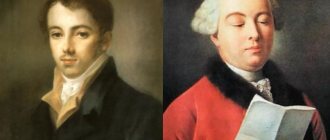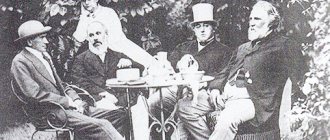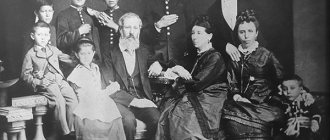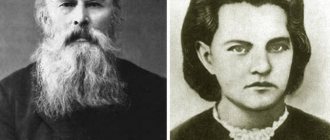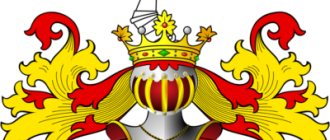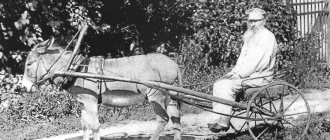Childhood and youth
The future writer and diplomat was born in Moscow. In literature textbooks they write that this happened in January 1785, but experts doubt this - then some facts from his biography become too surprising. There is an assumption that Alexander was born five years earlier, and the date in the document was written differently, since at the time of his birth his parents were not married, which was perceived negatively in those years.
By the way, in 1795, Alexander Griboedov had a brother, Pavel, who, unfortunately, died in his infancy. Most likely, it was his birth certificate that later served the writer. Sasha was born into a noble family, which descended from the Pole Jan Grzybowski, who moved to Russia. The Griboyedov surname is a literal translation of the Pole's surname.
The boy grew up curious, but at the same time sedate. He received his first education at home, reading books - some researchers suspect that this is due to hiding his date of birth. Sasha’s teacher was the encyclopedist Ivan Petrosalius, popular in those years.
Despite his sedate manner, Griboyedov was also prone to hooligan antics: once, while visiting a Catholic church, the boy performed the folk dance song “Kamarinskaya” on the organ, which shocked the clergy and visitors to the church. Later, already as a student at Moscow State University, Sasha will write a caustic parody called “Dmitry Dryanskoy,” which will also put him in an unfavorable light.
Even before studying at Moscow State University, Griboyedov entered the Moscow University Noble Boarding School in 1803. In 1806 he entered the literature department of Moscow State University, which he graduated in 2 years.
Afterwards, Griboedov decides to study in two more departments - physics and mathematics and moral and political. Alexander receives his PhD degree. He plans to continue his studies further, but his plans are ruined by the Napoleonic invasion.
During the Patriotic War of 1812, the future writer joined the ranks of the volunteer Moscow Hussar Regiment, led by Count Pyotr Ivanovich Saltykov. He was enrolled as a cornet along with other people from noble families - the Tolstoys, Golitsyns, Efimovskys and others.
Ideas of the Decembrists in Griboyedov’s comedy “Woe from Wit”
5
(1)
The great and talented writer, the founder of Russian realism, Alexander Sergeevich Griboedov, lived and worked during a difficult period of Russian history.
Griboyedov worked on his comedy “Woe from Wit” in the late 10th and early 20th years of the 19th century. These were significant years in the history of Russia. The Patriotic War of 1812 had just ended in victory. I think this victory confirmed the will of the Russian people for freedom and independence, their ardent love for the Motherland. People hated autocracy and serfdom, which hindered the economic and cultural development of the country.
After the Patriotic War, secret political societies began to appear in Russia, the members of which were revolutionary-minded nobles who were ready to fight tyranny and despotism. Future Decembrist societies were emerging in Moscow and St. Petersburg; the political mood of the noble youth, to which Griboyedov belonged, undoubtedly influenced his worldview and the direction of his work.
But such advanced thoughts did not take hold of everyone, and the majority of the population of Moscow still adhered to the old foundations of the serf system. The young nobles - revolutionaries - spoke out against this majority. This is the historical situation in the country that Griboedov reflected in his sharp and apt comedy “Woe from Wit.”
The image of Chatsky embodies features that make him similar to the Decembrists: deep love for the Russian people, hatred of serfdom, a desire to serve the cause, “not individuals,” a highly developed sense of self-esteem, true culture and enlightenment, unwillingness to put up with unjust social foundations. This determined his decisive and inevitable clash with Famusov, Skalozub, Molchalin, who personified serfdom and the selfish world of lordly Moscow.
In conflict. Chatsky with the Famusov Griboedov camp showed the struggle of two opposing social forces: noble revolutionaries and noble serf-owners, faithful to the foundations of the old society, where “noble scoundrels”, swindlers, and sycophants, informers and “sinister old women” operate. They do not want and cannot put up with the new era that has come. For them, Chatsky, who wants to preach freedom” and “does not recognize the authorities,” is “a dangerous person,” “crazy in everything and obsessed.”
It should be noted that Chatsky’s biography itself is the biography of a leading citizen of the Decembrist era.
Chatsky had his own estate. As a child, he was taken to be raised in the Famusovs' house. But soon the sleepy silence of Famus’s house, where everything was built on pretense and deception, became very boring to him, and young Chatsky went on a journey to “search for the mind,” to look for the bright sides of life.
Upon returning, Chatsky sees that Moscow society has changed a lot compared to the time when he left it three years ago. Now the Famus world will no longer tolerate “freethinkers” and “Jacobins” and will not allow their vices to be openly exposed in Moscow living rooms.
Observing the deceitful life of this world, Chatsky does not take the slightest part in it. In no action or phenomenon will we find him dancing or playing cards. Everywhere he is an ardent activist, an enthusiast, striving to overcome the irreconcilable hostility to free life, trying to prove the need for science and cultural knowledge. “He is a faithful denouncer of lies,” “he demands space and freedom for his age,” “he brands sycophancy and buffoonery with shame.” He languishes among the empty, idle crowd of “tormentors, sinister old women, quarrelsome old men,” refusing to bow to their morality, to their order. Many Decembrists had such a life, thought the same way and were rejected by reactionary society in the same way.
Famusov’s world opposes slander and lies to Chatsky, but he fights openly and directly; in his passionate and vivid monologues there is clearly a challenge to the dirty world of “sycophants” and “businessmen.”
They widely reveal Chatsky's public interests: public service, serfdom, education of a citizen, true enlightenment. Such speeches were probably made at meetings of secret political societies of future Decembrists. And Chatsky’s ideas coincide with their ideas and views.
Also, in the hero’s accusatory speeches, it is not difficult to guess the mood of the author himself, his author’s position.
Griboyedov directly communicated with the Decembrists during his lifetime and, as is known, approved of their goals and ideas. And therefore, in his politically topical work for that time, he could not reflect the historical movement of the Russian people forward into the future (which he showed through the struggle of Chatsky, a new hero, with the world of the Famusovs).
The inevitability of Chatsky’s collision with the society of Famusov, Skalozub and Molchalin, of course, is due to his views, ideas and aspirations.
Griboyedov, ardently sharing the ideas of the Decembrist nobles, endowed his main character with traits that made him similar to the Decembrists: deep love for the Russian people, hatred of serfdom, true culture and enlightenment, deep patriotism and readiness to fight for the truth - these are the qualities that define a bright the image of Chatsky, the main character of the immortal comedy of the great writer.
5 / 5. 1
.
Literature
In 1814, Griboyedov began to write his first serious works, which were the essay “On Cavalry Reserves” and the comedy “The Young Spouses,” which was a parody of French family dramas.
The following year, Alexander moves to St. Petersburg, where he ends his service. In St. Petersburg, the aspiring writer meets the publicist and publisher Nikolai Ivanovich Grech, in whose literary magazine “Son of the Fatherland” he would later publish some of his works.
In 1816 he became a member of the Masonic lodge “United Friends”, and a year later he organized his own lodge - “Blago”, which will differ from classical Masonic organizations by focusing on Russian culture. At the same time, the writer begins work on “Woe from Wit” - the first ideas and sketches appear.
In the summer of 1817, Griboyedov entered the civil service at the Collegium of Foreign Affairs, first as a provincial secretary, and later as a translator. In the same year, Griboyedov met Wilhelm Kuchelbecker.
He will become friends with both of them and will cross paths more than once in his short life. While still working as a provincial secretary, the writer wrote and published the poem “Lubochny Theater,” as well as the comedies “Student,” “Feigned Infidelity” and “The Married Bride.” The year 1817 was marked in Griboyedov’s life by another event - the legendary quadruple duel, the reason for which was the ballerina Avdotya Istomina (as always, cherchez la femme).
However, to be precise, in 1817 only Zavadovsky and Sheremetev fought, and the duel between Griboedov and Yakubovich took place a year later, when the writer, having refused the position of an official of the Russian mission in America, became the secretary of the Tsar's attorney Simon Mazarovich in Persia. On the way to his place of duty, the writer kept a diary in which he recorded his journey.
In 1819, Griboyedov completed work on “Letter to a Publisher from Tiflis” and the poem “Forgive me, Fatherland.” Autobiographical moments related to the period of service in Persia will also appear in “Vagina's Tale” and “Ananur Quarantine”. In the same year he received the Order of the Lion and the Sun, first degree.
The writer did not like working in Persia, so he was even glad that his arm was broken in 1821, because thanks to the injury, the writer was able to achieve a transfer to Georgia, closer to his homeland. In 1822 he became diplomatic secretary under General Alexei Petrovich Ermolaev. At the same time he wrote and published the drama “1812”, dedicated to the Patriotic War.
In 1823, he left the service for three years to return to his homeland and rest. Over the years he has lived in St. Petersburg, Moscow and on the estate of an old friend in the village of Dmitrovskoye. He is finishing work on the first edition of the comedy in verse “Woe from Wit,” which he gives to an elderly fabulist for review. Ivan Andreevich appreciated the work, but warned that the censors would not let it through.
In 1824, Griboedov wrote the poem “David”, the vaudeville “Deception after Deception”, the essay “Special Cases of the St. Petersburg Flood” and the critical article “And they compose - they lie, and they translate - they lie.” The following year he began work on a translation of Faust, but managed to finish only the Prologue in the Theater. At the end of 1825, due to the need to return to service, he was forced to abandon his trip to Europe, instead leaving for the Caucasus.
After participating in the expedition of General Alexei Alexandrovich Velyaminov, he wrote the poem “Predators over Chegel.” In 1826, he was arrested and sent to the capital on suspicion of Decembrist activities, but six months later he was released and reinstated in service due to the lack of direct evidence. Nevertheless, the writer was under surveillance.
In 1828, Griboyedov took part in the signing of the Turkmanchay Peace Treaty. In the same year he received the Order of St. Anne, second degree, and got married. The writer was unable to write or publish anything else, although his plans included many works, among which creativity researchers especially highlight the tragedies of and. According to them, Griboyedov had potential no less than that of.
Griboedov in the Caucasus
In the summer of 1818, in need of funds, Griboedov became secretary of the Persian mission under the commander-in-chief of the Separate Caucasian Corps, General A.P. Ermolov. True, he did not want to go to Persia. “Imagine,” he wrote to S.N. Begichev, his close friend, - that they certainly want to send me - where do you think? - To Persia, and to live there. No matter how I deny it, nothing helps; however, the day before yesterday, at the invitation of our Minister, I visited him and announced that I would not decide otherwise (and even then not probably) than if I were given two ranks immediately upon my appointment to Tehran. He winced, and I imagined to him with all sorts of French eloquence that it would be cruel for me to spend my blooming years among the porcupines of Asia, in voluntary exile, to be separated from friends and relatives for a long time, to give up the literary successes that I have the right to expect here, from any communication with enlightened people, with pleasant women, to whom I myself can be pleasant (don’t laugh: I’m young, a musician, in love and willingly talk nonsense, what else do they want?), in a word, it’s impossible for me to sacrifice myself without at least a little proportionate retribution. - “You will improve your talents in solitude.” — “Not at all, V.S., a musician and a poet need listeners, readers; they are not in Persia."
Griboyedov was given a choice: to go to the Russian mission in the Union of American United States or to the Caucasus and Persia. After thinking, he chose the latter. But he left the capital with a heavy heart, scattering only in Tiflis, where he often visited the house of P.N. Akhverdova, who raised the young princess Nina Chavchavadze, who later became his wife; There Griboyedov became friends with Georgian poets - A. Chavchavadze (future father-in-law), I. Baratashvili, G. Orbeliani.
Alexander Griboedov in his teenage years. Portrait of an unknown artist.
In February 1819, the Russian diplomatic mission arrived in Tabriz, the residence of the heir to the Shah's throne, Abbas Mirza, and was then received by the Shah in Tehran. “A stay in Persia and a secluded life in Tabriz did Griboyedov great benefit,” Begichev later wrote. “His strong will strengthened, his constant curiosity no longer had barriers or distractions. He read a lot in all subjects of science and studied a lot.” According to the Treaty of Gulistan, the Russian mission had the right to demand from the Persians the return of Russian soldiers - wounded and deserters. “Having met two or three sarbaz (Russian soldiers who joined the Persian regular army) on the street,” wrote Begichev, “he (Griboyedov) began to tell them that they had acted vilely, betraying the oath and the fatherland, etc., probably very convincingly , because the soldiers were touched by this and asked him: does he guarantee that they will not be punished if they return to Georgia? Griboyedov replied that he could not vouch for this, but he would try to do so; however, if they suffer for a crime, then it is better to suffer once, but clear your conscience.” As a result, in the fall of 1819, Griboyedov led an entire detachment of seventy sarbaz to Tiflis, for which he was presented with a reward by General Ermolov.
In Tiflis, Griboedov began work on the comedy “Woe from Wit.” It is known that a certain prophetic dream is associated with its creation. In this dream, the poet saw his close friend, who asked if he had written anything for him? Since Griboyedov replied that he had long ago deviated from all writing, his friend shook his head: “Give me a promise that you will write.” - “What do you want?” - “You know it yourself.” - “When should it be ready?” - “Definitely in a year.” “I oblige,” Griboyedov answered.
Personal life
There is a theory that the quadruple duel of 1817 took place due to a short intrigue between Griboedov and the ballerina Istomina, but there are no facts to prove this hypothesis. On August 22, 1828, the writer married the Georgian aristocrat Nina Chavchavadze, whom Alexander Sergeevich himself called Madonna Bartalome Murillo. The couple was married in the Zion Cathedral, located in Tiflis (now Tbilisi).
By the end of 1828, Alexander and Nina realized that they were expecting a child. That is why the writer insisted that his wife stay at home during his next ambassadorial mission the following year, from which he never returned. The news of her husband's death left the young girl in shock. Premature birth occurred and the baby was stillborn.
Death
At the beginning of 1829, Griboyedov was forced by work to go as part of an embassy mission to Feth Ali Shah in Tehran. On January 30, the building in which the embassy was temporarily located was attacked by a large group of Muslim fanatics (more than a thousand people).
Only one person managed to escape; by pure chance, he ended up in another building. Alexander Griboyedov was found among the dead. His disfigured body was recognized by the injury to his left hand received during a duel with cornet Alexander Yakubovich in 1818.
Posthumously, Griboedov was awarded the Order of the Lion and the Sun, second degree. The writer was buried, as he had bequeathed, in Tiflis, on Mount Mtatsminda, located next to the Church of St. David.
- Griboyedov’s parents were distant relatives: Anastasia Fedorovna was Sergei Ivanovich’s second cousin.
- Sergei Ivanovich, Griboyedov’s father, was a renowned gambler. It is believed that it was from him that the writer inherited a good memory, thanks to which he was able to become a polyglot. His arsenal included French, English, Italian, German, Arabic, Turkish, Georgian, Persian and ancient Greek, as well as Latin.
- Griboedov's sister, Maria Sergeevna, was at one time a popular harpist and pianist. The writer himself, by the way, also played music well and even managed to write several piano pieces.
- Artists depicted Griboyedov and some of his relatives on canvas. The writer's wife is the only one who was captured in the photo.
Bibliography
- 1814 – “The Young Spouses”
- 1814 – “On cavalry reserves”
- 1817 – “Lubochny Theater”
- 1817 – “Feigned Infidelity”
- 1819 – “Letter to the publisher from Tiflis”
- 1819 – “Forgive me, Fatherland”
- 1822 – “1812”
- 1823 – “David”
- 1823 – “Who is brother, who is sister”
- 1824 – “Teleshova”
- 1824 – “And they compose - they lie, and they translate - they lie”
- 1824 – “Woe from Wit”
- 1825 – “Predators on Chegem”
Russian playwright, diplomat and composer Alexander Sergeevich Griboyedov was born on January 15 (4 according to the old style) 1795 (according to other sources - 1790) in Moscow. He belonged to a noble family and received a serious education at home.
In 1803, Alexander Griboyedov entered the Moscow University Noble Boarding School, and in 1806 - Moscow University. In 1808, having graduated from the verbal department with the title of candidate, he continued to study in the ethical and political department.
He spoke French, English, German, Italian, Greek, Latin, and later mastered Arabic, Persian, and Turkish.
With the beginning of the Patriotic War of 1812, Griboedov left his academic studies and joined the Moscow Hussar Regiment as a cornet.
At the beginning of 1816, having retired, he settled in St. Petersburg and entered the service of the Collegium of Foreign Affairs.
Leading a secular lifestyle, he moved in the theatrical and literary circles of St. Petersburg. He wrote the comedies “Young Spouses” (1815), “One’s Own Family, or The Married Bride” (1817) in collaboration with playwrights Alexander Shakhovsky and Nikolai Khmelnitsky, “Student” (1817) together with the poet and playwright Pavel Katenin.
In 1818, Griboyedov was appointed secretary of the Russian mission to Persia (now Iran). Not the least role in this kind of exile was played by his participation as a second in the duel of the chamber cadet Alexander Zavadsky with officer Vasily Sheremetev, which ended in the death of the latter.
Since 1822, Griboyedov in Tiflis (now Tbilisi, Georgia) held the position of secretary for diplomatic affairs under the commander of Russian troops in the Caucasus, General Alexei Ermolov.
The first and second acts of Griboyedov’s famous comedy “Woe from Wit” were written in Tiflis. The third and fourth acts were written in the spring and summer of 1823 while on vacation in Moscow and on the estate of his close friend, retired colonel Stepan Begichev, near Tula. By the autumn of 1824, the comedy was completed, and Griboyedov went to St. Petersburg, intending to use his connections in the capital to obtain permission for its publication and theatrical production. Only excerpts published in 1825 by Thaddeus Bulgarin in the almanac “Russian Waist” were censored. Griboyedov's creation spread among the reading public in handwritten copies and became an event in Russian culture.
Griboedov also composed musical pieces, including two popular waltzes for piano. He played the piano, organ, and flute.
In the fall of 1825, Griboyedov returned to the Caucasus. At the beginning of 1826, he was arrested and taken to St. Petersburg to investigate alleged connections with the Decembrists, the instigators of the uprising in the capital on December 14, 1825. Many of the conspirators were close friends of Griboyedov, but in the end he was acquitted and released.
Upon returning to the Caucasus in the fall of 1826, he took part in several battles of the outbreak of the Russian-Persian War (1826-1828). Having brought the documents of the Turkmanchay Peace Treaty with Persia to St. Petersburg in March 1828, Griboedov was awarded and appointed minister plenipotentiary (ambassador) to Persia.
On his way to Persia, he stopped for a while in Tiflis, where in August 1828 he married 16-year-old Nina Chavchavadze, the daughter of the Georgian poet, Prince Alexander Chavchavadze.
In Persia, among other matters, the Russian minister was involved in sending captive Russian citizens to their homeland. An appeal to him for help by two Armenian women who had fallen into the harem of a noble Persian was the reason for reprisals against the diplomat.
Reactionary Tehran circles, dissatisfied with the peace with Russia, set a fanatical crowd against the Russian mission.
On February 11 (January 30, old style), 1829, during the defeat of the Russian mission in Tehran, Alexander Griboyedov was killed.
Together with the Russian ambassador, all embassy employees, except for secretary Ivan Maltsev, and the Cossacks of the embassy convoy died - a total of 37 people.
Griboyedov's ashes were in Tiflis and interred on Mount Mtatsminda in a grotto at the Church of St. David. The tombstone is crowned with a monument in the form of a weeping widow with the inscription: “Your mind and deeds are immortal in Russian memory, but why did my love survive you?”
Griboedov's son, baptized Alexander, died without living even a day. Nina Griboedova never remarried and never took off her mourning clothes, for which she was called the Black Rose of Tiflis. In 1857, she died of cholera, refusing to leave her sick relatives. She was buried next to her only husband.
Persia paid for the death of the Russian ambassador with rich gifts, including the famous Shah diamond, which is kept in the collection of the Russian Diamond Fund.
The comedy in verse by Griboyedov “Woe from Wit” was staged in Moscow in 1831 and published in 1833. Her images became household names, and individual poems became sayings and catchphrases.
A canal and a garden in St. Petersburg were named after Griboyedov. In 1959, a monument to the writer was erected on Pionerskaya Square.
In 1959, a monument to Alexander Griboyedov was erected in Moscow at the beginning of Chistoprudny Boulevard.
In 1995, the State Historical, Cultural and Natural Museum-Reserve A.S. was opened in the Smolensk region. Griboyedov “Khmelita” is the family estate of the Griboyedovs, with which the playwright’s childhood and early youth are associated.
The material was prepared based on information from RIA Novosti and open sources
Griboedov Alexander Sergeevich is one of the most educated, talented and noble men of the 19th century. An experienced politician, a descendant of an ancient noble family. The scope of his creative activity is extensive. He was not only an excellent playwright and poet, the author of the famous “Woe from Wit,” but also a talented composer, a polyglot who spoke ten languages.
Alexander Sergeevich was born on January 15, 1795 in Moscow. His parents gave him an excellent education at home. Since 1803, a student at a boarding school at Moscow University. At the age of 11, a student at the same university. The most educated man of his era, while still a student, mastered nine languages, six European and three Eastern. As a true patriot of his homeland, he volunteered to fight Napoleon. From 1815, he served in the reserve cavalry regiment with the rank of cornet. This is the time when he begins to write articles, his first play “The Young Spouses”. After retiring in the winter of 1816, he lived in St. Petersburg, where he worked in the Ministry of Foreign Affairs. Here a circle of theatergoers and writers enters, gets acquainted with Pushkin and other poets.
There's no such thing as too much talent
But Griboyedov’s record as a diplomat is persistently ignored. Meanwhile, there are six of these lists, and in all of them the same date of birth is recorded, first of the modest secretary of the Persian mission, and then of the plenipotentiary ambassador of the Russian Empire in Iran - 1790. In principle, such persistence is understandable. If we accept the date from the documents of the Ministry of Foreign Affairs of the Russian Empire as correct, then the beautiful legend about Griboyedov the child prodigy, who at the age of 11 entered Moscow University, received a candidate of literature degree at the age of 13, transferred to another faculty and at the age of 15 became a candidate of law, will collapse. but he did not leave the university, continuing to study – this time in mathematics and natural sciences.
Article on the topic
Pen and service.
How poets and playwrights succeeded in politics Why such a legend is needed at all is completely unclear. It is unlikely that Griboyedov’s figure needs any additional embellishment. Roughly speaking, only one person truly doubted Griboyedov’s talents - Griboyedov himself. And even then his doubts can be attributed to a kind of coquetry. Let’s say, while talking with actor Pyotr Karatygin, he received a compliment:
“Ah, Alexander Sergeevich!” How many talents God has given you - you are a poet, a musician, a dashing cavalryman and, finally, an excellent linguist!
“Believe me, Petrusha,” Griboedov allegedly answered. - He who has many talents does not have a single real one...
Let us note that among all the talents of Alexander Sergeevich, his contemporary did not find it necessary to mention what seemed to be the most obvious to us - the talent of a diplomatic worker. And, apparently, he did the right thing. Because if he had acted differently, he might have faced a pretty harsh rebuke.
Wanderer of Russian poetry. Griboyedov is one of the most mysterious figures of the 19th century. More details
Creation
His first attempts at writing in literary work date back to 1817. These are co-authored plays “Student” (co-author P.A. Katenin) and “Own Family” (wrote the beginning of the second act), joint work with A.A. Shakhovsky and N.I. Khmelnitsky. The comedy “Feigned Infidelity,” created in collaboration with A.A. Gendre, was staged on the theater stage in Moscow and St. Petersburg throughout 1818. At the same time, he was appointed secretary of the Tsar’s attorney for the Russian mission in Tehran. This event changed a lot in his life. Friends considered the appointment a punishment for participating as a second in a duel between officer V.N. Sheremetev and Count A.P. Zavadovsky because of the ballerina A.I. Istomina. The winter of 1822 was marked by an appointment to a new duty station and the position of secretary for the diplomatic department under the command of General A.P. Ermolov. Here, in Georgia, the first two acts of “Woe from Wit” were born.
In the spring of 1823, Alexander Sergeevich received leave and went to Russia, where he stayed until the end of 1825. The time spent in Russia for Griboedov was a time of active participation in literary life. Thanks to collaboration with P.A. Vyazemsky, the vaudeville “Who is brother, who is sister, or deception after deception” was created. In 1824, in St. Petersburg, work on the comedy “Woe from Wit” was completed. However, her path turned out to be difficult. The censors did not let the play pass and it was sold in manuscript. Some parts of the comedy were published. But the work of A.S. has already been highly appreciated. Pushkin. A trip to Europe planned in 1825 was postponed due to a call to Tiflis. And at the beginning of the winter of 1826, he was detained in connection with the uprising on Senate Square. The reason was friendship with K.F. Ryleev and A.A. Bestuzhev, publishers of the Polar Star almanac. However, his guilt was not proven; he was released and began service in the fall of 1826.
Griboedov and the Decembrists
Two most important socio-political events of the first quarter of the 19th century. The direction and nature of Griboyedov’s creativity were determined by the Patriotic War of 1812 and the Decembrist uprising. The whole situation of national upsurge, the great movement of the people who stood up to defend their Fatherland, could not help but excite the future playwright, predetermining the formation and development of his freedom-loving sentiments.
Griboedov was close to many Decembrists, although, apparently, he was not formally a member of the secret society. The question of Griboyedov’s attitude to the Decembrist movement is still debatable. The opinion of V.N. Orlov can be considered convincing that Griboyedov, throughout the entire cast of his critical and state mind, from the point of view of a real politician, before others, acutely felt the weakness of the noble revolutionaries. Fully sharing their ideas, he nevertheless doubted the success of the military conspiracy, carried out without the support of the broad masses of the people and thereby doomed to failure. Therefore, the phrase that is traditionally attributed to Griboyedov: “100 ensigns want to change the entire state life of Russia” was related not to the basic principles of the Decembrists, but to their tactics.
In his early work, Griboyedov acted as the author of comedies, written mainly in collaboration with P. Ya Katenin (“Student”, 1817), with A. A. Shakhovsky and N. I. Khmelnitsky (“Own Family, or The Married Bride”, 1818) and others. He alone owned the comedy “The Young Spouses” (1814). Despite all the ideological and artistic immaturity of Griboyedov’s early comedies, one can notice in them an exposure of the cruelty, stinginess and idleness of serf owners, witty criticism of sentimentalists (“Student”), realistic sketches of everyday life, lively, natural monologues (“Own Family, or The Married Bride”). Thus, creative experience gradually accumulated, which was useful to Griboedov when creating “Woe from Wit.”
Share
Related materials:
- Essay: Conflict of generations in the play “Woe from Wit” (A.S. Griboyedov) (612 words) At first glance, in the comedy by A.S. Griboyedov's "Woe from Wit" there are two obvious conflicts - love and the conflict of the hero with society. But if…
- Test with answers: “Woe from Wit” A.S. Griboyedov 1. The type of literature to which the play “Woe from Wit” belongs: a) epic b) lyrical c) dramatic + d) lyrical-epic 2. Chatsky was not in Moscow: a) 3 months; b) 3 years; +c) 5 years;d)…
- Alexander Sergeevich Griboyedov There are many mysteries and gaps in Griboedov’s biography, especially in childhood and youth. Neither his year of birth is known for certain (although the day is definitely known - the 4th...
- Griboyedov: the beginning of literary activity During his student years, Alexander Sergeevich’s passion for theater and literature began. A handwritten magazine was published at the boarding school and university, there were literary circles, amateur performances were organized, and…
- Alexander Sergeevich Griboedov - student years During his student years, Alexander Sergeevich's passion for theater and literature began. A handwritten magazine was published at the boarding school and university, there were literary circles, amateur performances were organized, and…
- Chatsky and the Decembrists The main character of the comedy A.S. Griboedov's "Woe from Wit" Chatsky is a typical representative of that part of Russian society in the first quarter of the 19th century, which carried new...
- Chatsky and the Decembrists (based on the comedy “Woe from Wit” by A.S. Griboyedov) The comedy “Woe from Wit” was written during the years of the creation of secret revolutionary organizations, of which the Decembrists were members. The fight against numerous opponents - noble revolutionaries, the fight against a new...
- Ideas of Decembrism in Griboyedov’s comedy “Woe from Wit.” Chatsky and the Decembrists “Woe from Wit” is a socio-political comedy. Griboyedov gave in it a true picture of Russian life after the Patriotic War of 1812. The comedy raises topical social issues...
- Ideas of Decembrism in Griboyedov’s comedy “Woe from Wit.” Chatsky and the Decembrists “Woe from Wit” is a socio-political comedy. Griboyedov gave in it a true picture of Russian life after the Patriotic War of 1812. The comedy features topical social issues...
- History test Reaction period. Decembrists 10th grade History test Reaction period. Decembrists 10th grade with answers. The test consists of 2 options, each option has 2 parts (part A has 4...
Last appointment and love
In 1828, he took part in the signing of the beneficial Turkmanchay Peace Treaty. The merits of the talented diplomat were noted by his appointment as Russian Ambassador to Persia. However, he himself was inclined to view this appointment as an exile. Moreover, with this assignment, many creative plans simply collapsed. However, in June 1828 he had to leave St. Petersburg. On the way to Persia, he lived for several months in Tiflis, where he married the 16-year-old Georgian princess Nina Chavchavadze. Their relationship, full of romanticism and love, was imprinted for centuries in her words, engraved on the tombstone of Alexander Sergeevich: “Your mind and deeds are immortal in Russian memory, but why did she outlive you, my love?” They lived only a few months in marriage, but this woman carried loyalty to her husband throughout the rest of her life.

